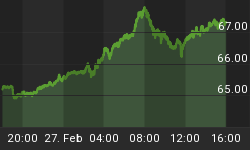The most recent GDP figures seem to echo what Fed Chairman Greenspan said in February in his semiannual Monetary Policy Report to the Congress. For brevity's sake I'll condense his opinion about the U.S. economy into three words: All is well.
I could offer a fact-filled and scathing rebuttal, but why be quarrelsome? Instead I'd like to answer this simple question: "How quickly can a very large industrial economy go from good to bad?" My case-in-point is recent indeed -- up through the business news as of February 16, 2005. All the headlines and subheads come from BBC News reports. Please note the dates.
Export-led growth spurt for Japan
Japan's economy grew at its fastest rate in 13 years in the last quarter of 2003, helped by a rise in exports to the United States and China (Feb. 18, 2004).Optimism at 7-year high in Japan
Business confidence in Japan is at its highest level for seven years, the Japanese central bank's latest quarterly survey has found (April 1, 2004).Mixed message for Japan's economy
A surprise slowdown in industrial output growth has raised doubts about the strength of Japan's recovery (June 29, 2004).Slower growth in Japanese economy
The Japanese economy grew at a slower than expected rate during the quarter to June, according to new figures (Aug. 13, 2004).Japanese growth grinds to a halt
Growth in Japan evaporated in the three months to September, sparking renewed concern about an economy not long out of a decade-long trough (Nov. 12, 2004).Japan economy slides to recession
The Japanese economy has officially gone back into recession for the fourth time in a decade (Feb. 16, 2005).
Mind you, the reports of growth and optimism just one year ago in Japan looked convincing indeed. The Japanese economy and stock market had been through bouts of deflation and decline since 1990; the Nikkei index saw rallies of 48%, 34%, 56% and 62% before hitting a 20-year low in April 2003.
Japan's central bankers tried (and keep trying) every monetary policy trick in the book. And when those policies appeared to be working, they spoke with just as much confidence as Mr. Greenspan has.
Policymakers can't come to your rescue -- no one can take better care of your financial future than you can. Investors who don't give in to false hope can take advantage of real opportunities.















